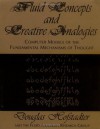251
Followers
4
Following
Manny Rayner's book reviews
I love reviewing books - have been doing it at Goodreads, but considering moving here.
Currently reading
The Greatest Show On Earth: The Evidence For Evolution
R in Action
Fluid Concepts and Creative Analogies
McGee on Food and Cooking: An Encyclopedia of Kitchen Science, History and Culture
Epistemic Dimensions of Personhood
Pattern Recognition and Machine Learning (Information Science and Statistics)
Relativity, Thermodynamics and Cosmology
The Cambridge Handbook of Second Language Acquisition
 There are some books you love because you feel that the author is taking you into their confidence, and treating you as an equal. Catherine Townsend's Sleeping Around is my favorite kiss-and-tell book. It's just as if she's giving me the latest gossip about her wonderfully disorganized life over a few drinks at the latest trendy bar, asking for my advice about whether she should dump X, who's nothing but trouble but so great in bed, and instead get together with Y, who's not as exciting but a more solid prospect. And I get the same kind of buzz from Winston Churchill's History of the Second World War. He's invited me to dinner again at his club, and over the port he's groaning about how difficult old Joe Stalin used to be, and all the crap he had to put up with. Well exactly! I know just what it's like to be forced to work with impossible people in order to save civilization as we know it from an implacably evil foe. I'm constantly having to deal with that sort of problem.
There are some books you love because you feel that the author is taking you into their confidence, and treating you as an equal. Catherine Townsend's Sleeping Around is my favorite kiss-and-tell book. It's just as if she's giving me the latest gossip about her wonderfully disorganized life over a few drinks at the latest trendy bar, asking for my advice about whether she should dump X, who's nothing but trouble but so great in bed, and instead get together with Y, who's not as exciting but a more solid prospect. And I get the same kind of buzz from Winston Churchill's History of the Second World War. He's invited me to dinner again at his club, and over the port he's groaning about how difficult old Joe Stalin used to be, and all the crap he had to put up with. Well exactly! I know just what it's like to be forced to work with impossible people in order to save civilization as we know it from an implacably evil foe. I'm constantly having to deal with that sort of problem.If you're a chess player, there's a fair chance you'll feel the same way about Garry's magnum opus. We've managed to link up for a quick dinner at the airport while he's on his way from an exhibition match against a top Grandmaster to a high-level meeting with the Russian political opposition, and he's telling me about the Capablanca-Alekhine match back in 1927. There were some moments that so reminded him of one of his own matches. And before I realize it, I'm thinking yes, isn't that exactly what often happens when you play a World Championship chess final, I'm sure similar things have happened to me too. Even his lightning-fast game analysis makes sense, as long as you don't pay too much attention to the details...
____________________________________
Re-reading My Great Predecessors for maybe the fourth time, and again I am blown away. You don't often see someone so utterly in control of his material.
It occurred to me that this book is a kind of glimpse of the post-Singularity world, when the machines will have become smarter than the humans, and we'll finally get clear answers to all sorts of questions that have been discussed for centuries. Of course, that's not possible yet in most subjects, but it is in chess. Kasparov has a complete database of all the important games that have ever been played, with good search software. He has analysis engines that are even stronger than he is, and never get tired or make a careless slip. He has access to an enormous chess library. And then he's one of the two strongest human players of all time, and writes quite well. What a combination.
It's incredible to see him examining classic encounters from the early 20th century. I just read his comments to the last game of the Lasker-Schlechter World Championship match, played in 1910. Lasker was one down; he had to win, and both players' nerves were violin-string tight. Kasparov has been in the same situation himself, so he knows from his own experience what it's like. We get some insightful comments about that. Then we proceed to the game itself. Many great players have looked at it, and Kasparov does a fine job of summing up their opinions; you feel he's chairing a panel discussion of the chess pantheon. Capablanca thought this, Alekhine thought that. We received an excellent suggestion from the floor here - Minev, just an ordinary Grandmaster.
When he arrives at the most complex point of the game, no human can quite cut it any more; but he ran his computer for several hours, and now we finally know the truth. He presents a shortened version of the machine's analysis. It's kind of a humbling experience.
____________________________________
Finished. Cocteau famously joked that Victor Hugo was a madman who believed he was Victor Hugo; he could equally well have said that Garry Kasparov was a madman who believed he was Garry Kasparov. As the book progresses, Kasparov logically traces the relationships between the great players of history, and how each one influenced the others. Steinitz inherited ideas from Philidor; Capablanca from Steinitz; Karpov from Capablanca; Alekhine from Chigorin; Tal from Alekhine.
Every now and then, he says a little about himself. This theme becomes increasingly pronounced as we get closer to the present. He considers that he is primarily an heir to the Chigorin-Alekhine-Tal line (dynamic attacking players), but also to the Philidor-Steinitz-Botvinnik school (the scientific approach) and the Capablanca-Fischer-Karpov line (intuitive positional play).
So, to sum up, he sees himself as the end-product of 1500 years of chess development, where all the bloodlines come together. The Kwisatz Haderach of chess, as Frank Herbert might have put it. Isn't that breathtakingly arrogant? But the truly incredible thing is that he might be right. Just imagine being able to feel that way about yourself.











